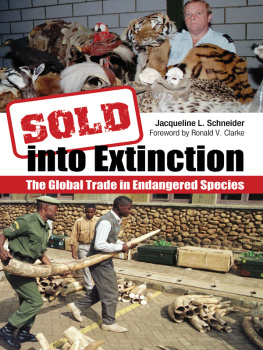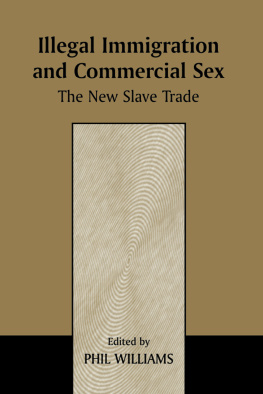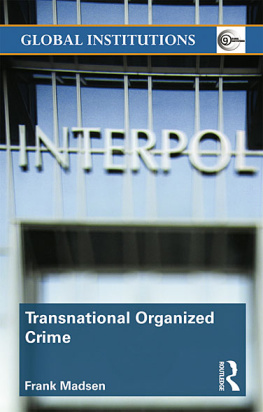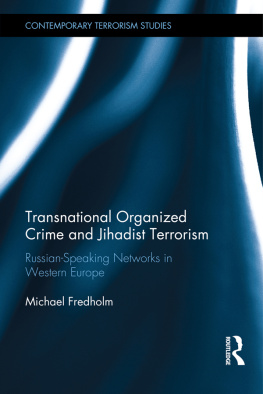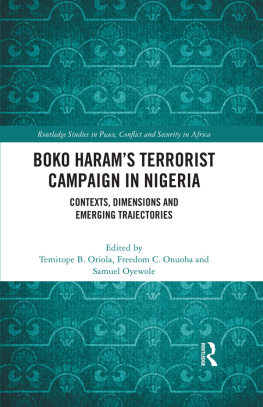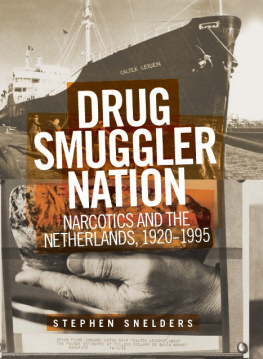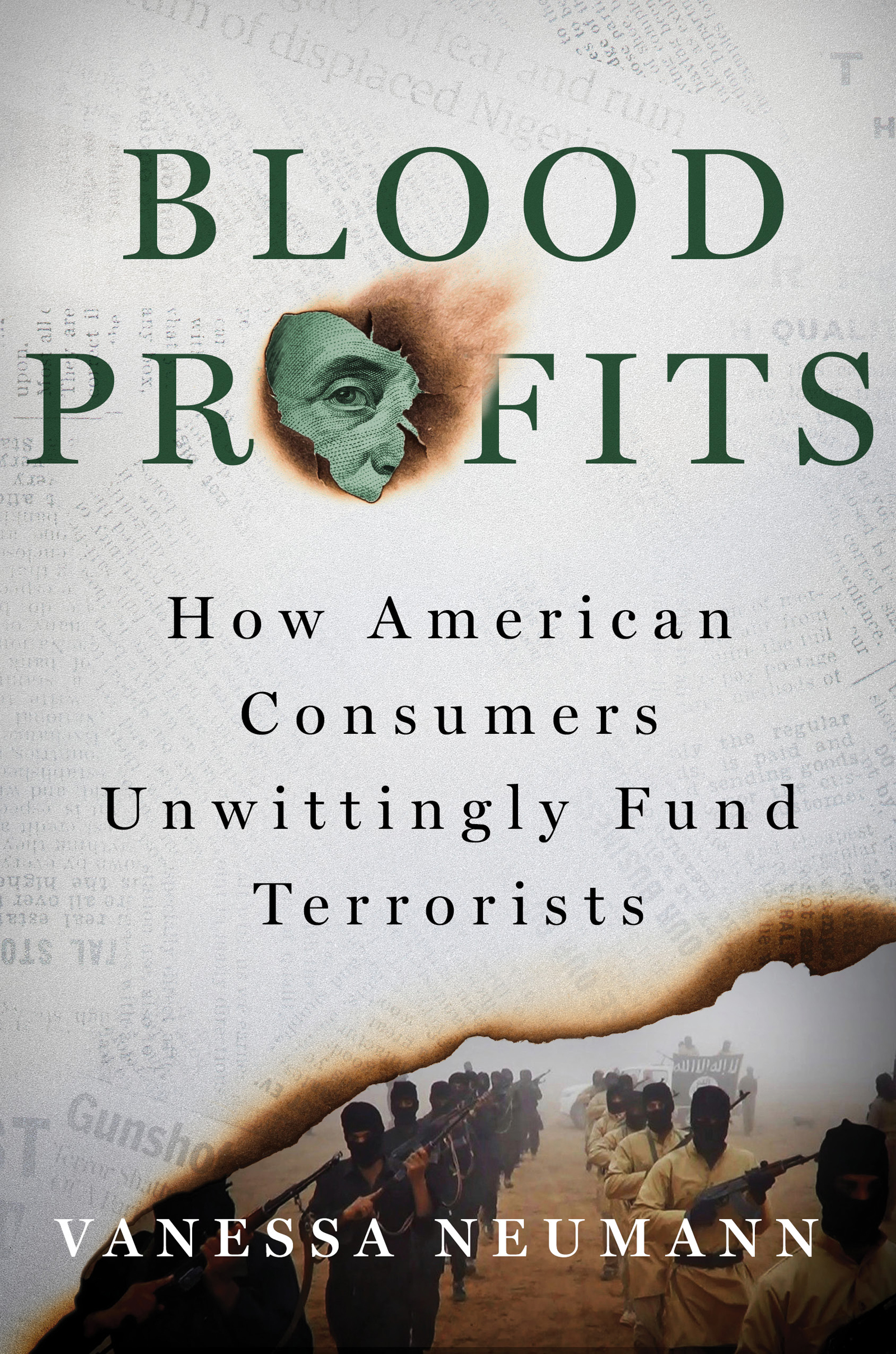Contents
Guide
Pagebreaks of the print version

The author and publisher have provided this e-book to you for your personal use only. You may not make this e-book publicly available in any way. Copyright infringement is against the law. If you believe the copy of this e-book you are reading infringes on the authors copyright, please notify the publisher at: us.macmillanusa.com/piracy.
For Stuart, and the ones, now stilled, now silentwho sacrificed
My earliest formulations of the links between illicit trade and terrorist finance appeared in publications for the Foreign Policy Research Institute.
This book would not have been possible without the valuable insights and contributions of numerous brilliant and talented professionals. I am greatly indebted to my agent, Keith Korman, of Raines & Raines, and my editor, Karen Wolny, of St. Martins Press. I am indebted also to: Jack Radisch of the Organisation for Economic Development and Co-operation (OECD); Professor Thomas Pogge at Yale Universitys Global Justice Program (GJP); Dr. Lieutenant Colonel Scott Crino; the Johns Hopkins University Applied Physics Laboratory; Danielle Schwab; Chris Howard; Deborah Ayis of the Counter-Terrorism Committee Executive Directorate (CTED) of the United Nations; General David Petraeus; former president of Mexico Felipe Caldern; Jean-Luc Moreau; Ron Noble; and Dr. Mathew Burrows of the Atlantic Council.
...
Five and twenty ponies,
Trotting through the dark
Brandy for the Parson, Baccy for the Clerk.
Laces for a lady; letters for a spy,
Watch the wall my darling while the Gentlemen go by!
........
If you meet King Georges men, dressed in blue and red,
You be careful what you say, and mindful what is said.
If they call you pretty maid, and chuck you neath the chin,
Dont you tell where no one is, nor yet where no ones been!
...
Five and twenty ponies,
Trotting through the dark
Brandy for the Parson, Baccy for the Clerk.
Them that asks no questions isnt told a lie
Watch the wall my darling while the Gentlemen go by!
This book and the events it describes were born of love and anger: love of two countries (the US and Venezuela), freedom, and dignity; anger at repression, corruption, and manipulation. Its in my blood.
My Neumann grandparents were Czech Jews, who lost most of their family to the Nazis and then escaped Soviet oppression with the help of a smuggler who got them to Venezuela, after the US had rejected them. In 1949, Venezuela was under a military dictatorship, but it was still the Promised Land to poor refugees: my grandparents worked hard and prospered, so much so that within ten years their son (my father) was going to boarding school in Millbrook, New York. He eventually married a middle-class American girl he met through her godparents, who worked for Shell Oil in Venezuela. The Neumann family business, Corimon, listed on the New York Stock Exchange in 1993, one of the first South American companies to do so. We and other Venezuelan business leaders set up an MBA program, one not only modeled on Harvards, but actually under the guidance of Harvard Business School professor Michael Porter, the guru behind the books Competitive Strategy and Competitive Advantage .
I was too nave to realize it then, but change was afoot. While attending Columbia University, I spent my summer holidays working on The Daily Journal (our English-language newspaper; much of its staff would move to The Latin American Herald Tribune , founded by The Daily Journals former editor) and in Corimons corporate planning and finance departments. As a Caracas socialite, I was featured in society pages, magazine covers, and even cinema newsreels.
The last Air France Concorde flight from Paris to Caracas was March 23, 1982, just a few months before I moved to the US. Middle-class Venezuelans used to make fun of Americans as poor, and there were frequent shopping flights from Caracas to Miami: fly out in the morning, shop all day, return to Caracas at night. It was the trope in a signature comedy sketch not unlike those one might see on Saturday Night Live: hordes of ill-mannered, newly middle-class Venezuelans would wreak havoc in Miami and then end the sketch with: Its cheapgive me two. Those were the Days of the 4.30, when Venezuelas currency, the Bolvar, was 4.30 to 1 US dollar. Now that currency is about Bs.F. 2,200,000 = US$1, and the channel on which that show airedstarted by the Venezuelan branch of the Phelps family, Rockefeller relationswas long ago closed by President Hugo Chvez. It was the channel with the broadest reach in Venezuela. I was there when the change began, but I was too nave to recognize its implications.
Colonel Chvez burst onto the political scene with fiery revolutionary rhetoric and great charisma during his failed coup in February 1992. In his one minute of national television the government gave him to call down his troops, Chvez announced: Our cause has not succeeded por ahora . Por ahora (for now) became his mottoand remained so more than a decade later when he ruled as president. In that 1992 speech, he expressed both I-will-be-back determination and accountability for what had gone wrong that day. Angry, poor, marginalized Venezuelans were impressed. No Venezuelan leader had taken any responsibility for anything that had gone wrong in decades: not the rising crime, not the rising inequality, not the rising corruption. Hugo Chvez instantly became a revolutionary hero to many: the battle for justice for the oppressed poor now had a heros face (Chvez) and a slogan ( por ahora ).
After being released from prison for the coup attempt, he prevailed in the 1998 presidential election: he rode a wave of anger and riots all the way to the presidential palace. After Chvez was elected, my grandfather cofounded another newspaper, called Tal Cual , which translates roughly as Just Soits how you punctuate a story you are telling in detail (It happened just so!) or how you express agreement with a story you are hearing. Tal Cual was designed to counter Chavismo , as the ideology of Hugo Chvez came to be known, and to be distributed in the poorer, pro- Chavista areas. The newspapers cofounder and editor-in-chief, Teodoro Petkoff, was a former Communist guerrilla, which made his rejection of the Chvez regime all the more powerful.
In my doctoral dissertation for Columbia University in the early 2000s, I wrote critically of Hugo Chvezs rise to the presidency of Venezuela and of his subsequent consolidation of power, which he justified in angry and divisive rhetoric. I thought it was a recipe for corruption and a dictatorial trampling of human rights.
I was right. By 2006, I was splitting my time between teaching political philosophy at Hunter College in New York and working for the International Institute of Strategic Studies, a London-based think tank that specializes in analyzing armed conflict. I was examining details of the low-intensity civil war in Colombia and looking at the roles of both the Chvez government in neighboring Venezuela and drug trafficking in empowering Colombias violent narcoterrorist insurgency (a terrorist insurgency that controls drug production in its territory), the Revolutionary Armed Forces of Colombia, better known by their Spanish acronym, FARC. From my research, I knew the Venezuelan Chvez-led Bolivarian Revolution was full of crime, corruption, and its own imperialist agenda, but in his first decade as president, Chvez had parlayed socioeconomic resentment into near-invincibility.


